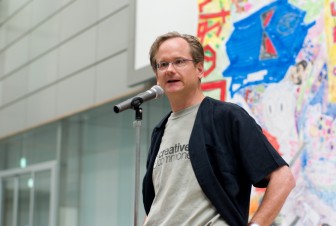NPQ’s Week in Review
Good Morning! We hope you enjoyed the weekend. At NPQ, what moves you is what moves us. The Week in Review highlights what our readers nominate as their favorite content and what they share with us and the community in the form of tweets, comments, contributed articles, and newswires.
But first, take a look at what you might have missed last week in some of the major news stories covered in NPQ.
AS FEES RISE MANY LEAVE BIG BANKS FOR NONPROFIT CREDIT UNIONS: As proposals of larger banks charging additional service fees arise, more and more people are taking action. Credit Unions are reporting a substantial increase in new demand since Bank of America announced its plan to charge five dollars a month for debit card use. Grassroots activists have even declared November 5th Bank Transfer Day. This effort appears to emerge out of the same sensibility as Occupy Wall Street.
ECONOMIC RECOVERY MAY STILL BE A LONG WAY OFF – THE STATS: a Wall Street Journal article last week provided a statistical look at why many of us do not believe that we are anywhere near the end of this recession. Among other disturbing facts: Median household income declined 3.2 percent between 2007 and 2009, down to $53,518, but declined another 6.7 percent to $49,909 between June 2009 and June 2011; “(T)he income of the typical American household, adjusted for inflation and in 2011 dollars, has dropped well below the January 2000 level ($55,836), and one out of every five homeowners with a mortgage is “underwater,” that is, they owe more on their mortgage loans than their homes are worth.
YOUNG PEOPLE’S LEADERSHIP HAS DIFFERENT RELATIONSHIP TO INSTITUTIONS: Ellen Alberding of the Joyce Foundation expressed hope as she made her own observations about the “differences” that young people are exhibiting in leadership.“As younger people are emerging as leaders in their own right, there’s a different view of institutions and how individuals interact with institutions. That’s really exciting.” She added, “Younger people are bold, and they are innovators.” As a comment on employment trends, she also noted, “People aren’t necessarily following the traditional paths as they come out of college, sometimes out of necessity.”
Readers’ Pick: THE Hottest article OF THE WEEK
OWS Spurs “Largest Mobilization of Pro-Bono Lawyers” in 40 years
As Occupy Wall Street continues to expand and get attention, protestors are being arrested all over the nation. A record-breaking number of attorneys are reaching out to the Occupiers—making their services available on a pro-bono basis to help represent and advise protestors. The National Lawyers Guild has been active in all of this. If protestors aren’t aware of their rights then confrontational situations with police and negotiations with public figures could get messy and unmanageable fast. A little knowledge of civil liberties can go a long way.
Conversation OF THE WEEK
Pinch Me I Must Be Dreaming: Is This the Future of Philanthropy?
This article was last week’s Hottest Article of the Week, but it continued to draw readers and lots of comments this week. The 40 comments were from nonprofit and philanthropic practitioners. Examples:
Melvin Thompson 2011-10-28 11:02
“As one of those newly minted nonprofit leaders, I couldn’t agree more. Some of these foundations are fairly myopic and often fail to see how some nonprofits blur the lines and contribute significantly and directly to other needs.
Quick example. At Habitat for Humanity Chicago South Suburbs, it has been difficult getting education-based foundations to fund us because we preserve affordable housing. Yet these same staid organizations are rapidly “discovering” that safe, decent shelter is the essential platform to health, education and well being. But here’s the kicker. They’re spending millions of dollars on research that nonprofits like ours already know.
We could use a changing of the guard in many respects to better illuminate the overlap of causes we serve.”
Samantha Castle 2011-11-03 03:03
These changes are already in action and swiftly becoming more apparent. Our We Give a Damn Programme in South Africa that promotes philanthropy amongst young professionals is constantly looking at different models with respect to giving. At one of our recent meetings young people had vigorous debates about how they would like to give. Some of the very same points mentioned in this article were confirmed in that discussion regarding Grantmaking. Young people are prepared to take more risks with their investment and take much more of an entrepreneurial approach. Our programme’s tagline is “Young People investing in Young People” and therefore they seek to use their grant innovatively to uplift young people. I think this is an exciting time as we as young people are changing the face of future philanthropy.
The conversation extended of course to Twitter:
Trending Tweets of the week

Thanks to all you tweeters out there. You help us spread the NPQ word and we’re grateful for your engagement. Rick Cohen’s piece on Wikileak’s donors leaving and it’s implications on the nonprofit sector ignited some intriguing tweets along with NPQ‘s timely article on protesters in Egypt supporting Occupy Oakland. Thanks to our community for surfacing and circulating what interests you! And if you don’t already, follow us on Twitter at @npquarterly.
NPQ’s READER Contributor of the week

NPQ loves it when one of its articles attracts commentary that further illuminates and sometimes challenges authors’ points. “Innovation and Impact: Less Talk, More Do,” by Cynthia Gibson, has this week continued to attract readers and well-informed comments that have built quite a resource list of readings, among other things. Below are just two of the many interesting comments you will find on the article.
Nick Deychakiwsky 2011-11-05 22:39
I think we’re in a means vs. end catch-22 here. For many, both impact and innovation are an end when they really are means. Innovation for what? needs to be asked more often. There’s the admonition “If it ain’t broken, don’t fix it!” that should not be forgotten. On the other hand, true innovation is most often not “the great totally original eureka IDEA!” but recombinations of (often small) things (approaches, patterns, models, resources, materials, ideas, etc.) into new and different configurations. In that sense, I don’t begrudge the people putting old wine into new bottles as much and will give them the benefit of the doubt – perhaps they’re trying to remix things so that the result is just a little bit different, fresher, and more useful (i.e. innovative) for the rest of us. Maybe it boils down to just re-articulation, but sometimes new language is helpful too.
Speaking of new language, can we find another word to use rather than IMPACT? Here’s what the online etymological dictionary has to say: “impact (v.) c.1600, “press closely into something,” from L. impactus, pp. of impingere “to push into, dash against, thrust at” (see impinge). Originally sense preserved in impacted teeth (1876). Sense of “strike forcefully against something” first recorded 1916. Figurative sense of “have a forceful effect on” is from 1935. Related: Impacting. impact (n.) 81, “collision,” from impact (v.). Figurative sense of “forceful impression” is from 1817 (Coleridge).
Although the word rings true for me as I hope to catch some snippets of college and pro football this weekend, I realize that it means something else in our philanthrojargon and goes more along the lines of the figurative sense that came to the fore in the early 20th century. Nevertheless, there is its subliminal implication – we are going to hit someone with something, or more mildly, force something on them. Which implies a top-down, outside-in, expert-driven technocratic approach to our interventions (another lousy word which implies we’re doing “for” and not “with”). Did using the term “impact” also come from our hard-hitting short-term-results-driven business world? How about effect, or influence, or import, or significance? Although none of these seems quite right to describe that which we are hoping to achieve. Any ideas? I don’t know, I’m not a linguist, but I am tired of feeling bruised by impact. Hope people don’t gang up on me for raising what might be a silly point (would that be collective impact?
And speaking of words, “measure” is another one I’m getting tired of. Check out an article by Steven Meyer called Community Philanthropy: Strategies for Impacting Vulnerable Populations on www.effectivecommunities.com. Although the title of the article isn’t the greatest if you’ve just read my previous paragraph, there’s an internal headline which is just great – Noticing Progress Instead of Measuring Impact. I like that.
Ellen Remmer 2011-11-07 06:49
Cindy’s willingness to say “the Emperor may be running around nude” is a breath of fresh air. We fall in love with some pretty stupid language and then think we’re actually doing it.
That said, I think C Christiensen’s work on innovation is helpful – distinguishing “sustaining innovations” from “disruptive” ones, the former being tweaks/improvements to an existing model and the latter being something really different, usually alot cheaper to do and good enough to shake things up. All in search of doing it better, which is a good thing, but let’s be honest about what’s really new… I mean innovative
NOW IT’S YOUR TURN! GIVE IT TO US.

Got a Tip for Us? We Need Your Voice Here
Did we miss something this week? What do you want to see us cover next week? Be our eyes and ears on the ground. Don’t hold back. Let us have it. And we’ll put it right here. Just let us know if you want it to be confidential.





















